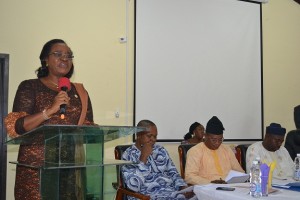
Ekiti State Deputy Governor, Professor Modupe Adelabu (left) delivering a speech at the 3-Day Residential Knowledge Sharing Workshop for Stakeholders in South-West States on Inclusive and Disability -Friendly Laws and Policies held at Ikogosi Warm Spring Resort, Ikogosi-Ekiti... on Thursday. Sitting, (left-right) are Executive Secretary of Ondo State Agency for the Welfare of Persons with Disability Mr. Folayemi Joshua, Deputy Speaker, Osun State House of Assembly, Hon. Babatunde Olaniyan and Ekiti State Commissioner for Youths and Sports, Mr. Kayode Olaosebikan.
Ekiti State Deputy Governor Prof Modupe Adelabu has cautioned against looking down on the physically challenged in the society, especially when considering people for positions and employments.
The deputy governor, who described as unfortunate that the physically challenged persons are often subjected to discrimination, restated government’s commitment to the welfare of persons with disabilities.
She spoke at the opening of a three-day workshop for “Residential knowledge sharing for stakeholders in Southwest states on inclusive and disability-friendly laws and policies,” at the Ikogosi Warm Spring Resort, Ikogosi-Ekiti.
According to her, the State Executive Council recently ratified and forwarded a Memorandum on a Bill for a Law on the Rights of Persons With Disabilities in the state to the House of Assembly for consideration and passage by the lawmakers.
Besides, she noted that the Council has also directed the Building Plan Approval Unit of the Ministry of Housing, Physical Planning and Urban Development to ensure that building plans conform henceforth conforms with accessibility standards for all users including those on wheel chairs.
She described as ironical that the society continued to look at people with disabilities as individuals to be pitied, feared or ignored, rather than take them as respectful members of the society, who has the wherewithal to attain their dreams and aspirations in life.
“People with disabilities are human beings. They are people who have abilities, interests and needs. They are individuals like you and I, seeking to live normal lives and they cut across all spheres of human endeavour. Among them are fathers, mothers and children, she said.”
Acknowledging that discrimination against the physically challenged must be outlawed, the deputy governor hailed organisers of the workshop – State Accountability and Voice Initiative (SAVI) through its civil society partner – Disability Partner Initiative (DPA), for bringing together critical stakeholders across the Southwest to harmonise positions on how to change societal perception towards the physically challenged.
Her words: “You are doing a great work by hosting representatives of state governments, media, civil society organisations, members of disability community and relevant stakeholders from the South-West geo-political zone to identify and deliver the needed change to bring about equality of opportunities for disabled people; public service reform which will support their independence and participation in the formulation and implementation of policies.
“What is needed is a bill of rights for persons with disabilities, and that is what this workshop is all about. People with disabilities are entitled to the same rights, privileges and freedoms as everybody else.”
According to her, the state government under the leadership of Governor Kayode Fayemi has never discriminated against the physically challenged since inception more than two years ago.
She told her audience that the state government has ensured that the physically challenged persons have unrestricted access to their full fundamental rights.
“The present administration of Dr John Kayode Fayemi has, from onset, incorporated this initiative into roadmap to Ekiti Socio-political economic recovery as encapsulated in the Eight-Point Agenda,” Prof Adelabu said, adding; “this is in line with the United Nation’s (UN) Convention on the Rights of the Disabled.
“The administration has not relented in extending its programmes to the physically challenged. For instance, it has disbursed the sum of N2.25 million on the training and resettlement programmes for visually-impaired persons. Presently, four visually-impaired persons are receiving vocational training at the Nigeria Farmcraft Centre for the Blind, Lagos.”
She also informed that the government organised a workshop to educate relevant stakeholders on how to handle persons with disabilities during rescue and emergency situations.
The deputy governor listed participants at the workshop to include: the Red Cross Society; Federal Road Safety Corps (FRSC); Nigerian Security and Civil Defence Corps (NSCDC); Ekiti State Traffic Management Agency (EKSTMA); State Emergency Management Agency (SEMA); Fire Services; and social workers.
Prof Adelabu also noted that the Fayemi administration has a policy to offer employment to qualified Persons With Disabilities.
“As we speak here today, the requests of 81 Persons with Disabilities for employment into the public service are undergoing consideration,” she said.
Besides, she said the government has accorded due attention to the sponsorship of Associations of Persons with Disabilities to meetings, seminars and workshops, pointing out that N350, 000 has been disbursed on the sponsorship of the executive members of the group to meetings in the past seven months.
The deputy governor said: “There is also a resettlement programme for destitute, beggars and mentally-challenged persons. They are regularly taken away off the streets by social workers, who resettle them with their families.
“It is important to state that mentally-challenged persons are given psychiatric treatment before taken to the Relief and Rehabilitation Centre, Ado-Ekiti.
“Also, it is expedient to note that scholarship awards to Persons with Disabilities who are undergoing regular courses in tertiary institutions are automatic in Ekiti State. One of the recent six beneficiaries of foreign post-graduate scholarship award is Mr. Olusegun Aluko, (a hearing-impaired scholar).
“The award is at the instance of the State Governor, His Excellency, Dr John Kayode Fayemi and some development partners.”
She urged participants to ensure that the workshop generates ideas to promote the passage and implementation of the Disability Bill across the South-West States and Nigeria at large and that it will also inform public understanding and prompt debate about disability and the issues facing them.
Last modified: August 15, 2013

